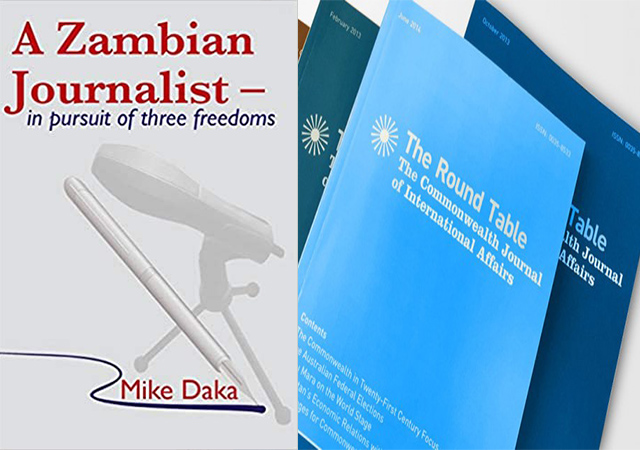
[This is an excerpt from a book review in The Round Table: The Commonwealth Journal of International Affairs.]
For someone like myself, not familiar with Zambia, Mike Daka is the ideal guide to take one on a fascinating and instructive journey through his career as a journalist and the changes that his country has undergone during that time. His autobiography, A Zambian Journalist – in pursuit of three freedoms, tracks his life as someone who started out without special privileges but through sheer perseverance, hard work and creativity became one of Zambia’s leading media figures.
Daka acknowledges that the odds were totally against him ‘because the African village is one of the roughest and toughest places to be born’ (p. 7). Many of his childhood friends ended up with criminal records and he credits his parents for ensuring that he had a good education and for inculcating a strong sense of discipline and hard work in their children. This helped Daka to clear the many hurdles he faced as he strove to achieve his goals.
Many who embark on a career in journalism often find that they are left to sink or swim once they get their feet on the first rung of the ladder. They will find that most colleagues in busy newsrooms have neither the time nor inclination to guide or advise a raw young reporter. This is why Daka’s book is immensely informative for those considering journalism as a career.
As Daka describes it: ‘My journey from childhood to senior citizenship was like a rollercoaster ride with a lot of exhilarating highs and many emotional lows. The different phases of my life were all quite engaging in their own ways. This book talks about the different stages of my life and the manner in which I had to constantly reinvent myself in order to achieve longevity in my professional work and in my life overall’ (p. 1).
Daka comes across as restless and ambitious, very clear about what he wants to achieve and he does not allow himself to be diverted. He is honest about his strengths and weaknesses. He used every opportunity which came his way to build his career and work his way up from being a junior reporter to an influential figure in the media world. He served in a variety of publications, media agencies and institutions including the Zambia News Agency, ZANA. He subsequently became a media trainer assuming the position of director and chief executive officer of ZAMCOM, Zambia Institute of Mass Communications. At the height of his success he quit to set up and operate a commercial radio station in a rural part of Zambia.
Daka’s account of his professional life includes his experiences abroad on training or work programmes or while attending Commonwealth summits and other international gatherings. He writes with insight about racism encountered by himself and fellow Africans during his travels. He describes instances in East Berlin when Africans were thrown out of trains as they were about to move off. Daka, however, is understanding about possible reasons for this perceived racism. He says it was believed that East German workmen were hostile and aggressive because they resented their government spending money on bringing Africans over and giving them higher education which, as locals, they were unable to obtain themselves. Daka refused to allow his negative experiences to detract from deriving the maximum benefit from his travels.
As Daka acknowledges, journalism practice in Zambia under the one-party state was very challenging because institutional leadership was authoritarian, while political and government leaders were autocratic. All stories were, therefore, carefully selected and edited and largely focused on presenting a good image of the ruling party and its government. Striving for independent journalism in these conditions was no easy undertaking but he learned to work within the system.
Inevitably, Daka had to overcome professional jealousy, political manoeuvring and other challenges. Undaunted, Daka pressed ahead with determination to instil high standards of journalistic practice and training in Zambia. He appears to have been a bold and far-sighted manager with a sharp eye for recruiting bright and enterprising people to run an extensive network of newspapers and media groups. He helped to establish PANA: Pan-African News Agency, PANA, which aimed to change the distorted image of Africa by promoting the collection and distribution of news on the continent. He spent thirteen years at the Zambia Institute of Mass Communications, ZAMCOM, which became one of the most important media institutions in Zambia and the Southern African region in the 1990s.
The sections where Daka gives names and details of the many individuals with whom he has interacted during his long career might be heavy going for those not familiar with Zambia.
A Zambian journalist – in pursuit of three freedoms by Mike Daka, Lusaka, Gadsden Publishers, 2020.
Rita Payne is President Emeritus, Commonwealth Journalists Association.



